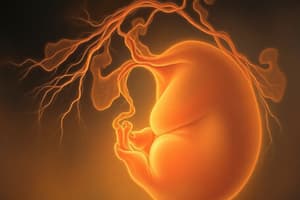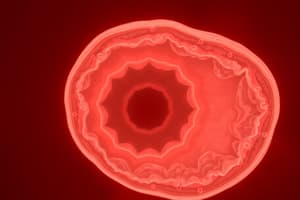Podcast
Questions and Answers
Which layers contribute to the formation of the trilaminar embryonic disc during gastrulation?
Which layers contribute to the formation of the trilaminar embryonic disc during gastrulation?
- Mesoderm and trophoblast only
- Ectoderm and Mesoderm only
- Endoderm and Ectoderm only
- Ectoderm, Mesoderm, Endoderm (correct)
Which type of tissue originates exclusively from the mesoderm?
Which type of tissue originates exclusively from the mesoderm?
- Epithelial Tissue
- Connective Tissue (correct)
- Muscle Tissue (correct)
- Nerve Tissue
What is the primary role of cells migrating to form the notochord during gastrulation?
What is the primary role of cells migrating to form the notochord during gastrulation?
- To initiate the formation of the endoderm
- To create the ectoderm
- To develop the respiratory system
- To replace the hypoblast (correct)
What is the result of epiblast cells that do not form part of the primitive streak or node?
What is the result of epiblast cells that do not form part of the primitive streak or node?
During which process is the bilaminar embryonic disc transformed into a trilaminar disc?
During which process is the bilaminar embryonic disc transformed into a trilaminar disc?
Which statement about the origin of epithelial tissues is true?
Which statement about the origin of epithelial tissues is true?
What occurs during the cleavage phase after fertilization?
What occurs during the cleavage phase after fertilization?
What is the significance of the zona pellucida during cleavage?
What is the significance of the zona pellucida during cleavage?
What initiates the process known as implantation?
What initiates the process known as implantation?
What role does progesterone play during the implantation process?
What role does progesterone play during the implantation process?
What is observed about the blastocyst during days 5-9 post-fertilization?
What is observed about the blastocyst during days 5-9 post-fertilization?
Which structure is responsible for the attachment of the blastocyst to the uterine wall?
Which structure is responsible for the attachment of the blastocyst to the uterine wall?
During which phase must the blastocyst's hatching coincide for successful implantation?
During which phase must the blastocyst's hatching coincide for successful implantation?
How does the cleavage process affect the nuclear to cytoplasmic ratio in the developing embryo?
How does the cleavage process affect the nuclear to cytoplasmic ratio in the developing embryo?
What is the term for gametogenesis in females?
What is the term for gametogenesis in females?
At what stage does oogenesis commence in females?
At what stage does oogenesis commence in females?
Which hormones promote the completion of the first meiotic division in oogenesis after puberty?
Which hormones promote the completion of the first meiotic division in oogenesis after puberty?
What is the primary outcome of oogenesis each menstrual cycle?
What is the primary outcome of oogenesis each menstrual cycle?
What is the term for the process in which a secondary oocyte is released from the ovary?
What is the term for the process in which a secondary oocyte is released from the ovary?
What must occur for fertilization to be successful?
What must occur for fertilization to be successful?
What is the final result of fertilization in human development?
What is the final result of fertilization in human development?
What happens during the cleavage stage of embryonic development?
What happens during the cleavage stage of embryonic development?
What is caused by the first 3-4 cell divisions during cleavage?
What is caused by the first 3-4 cell divisions during cleavage?
Flashcards are hidden until you start studying
Study Notes
Gastrulation and Basic Tissue Origin
- Cells migrate from the primitive node to form the notochord, replacing the hypoblast and generating the endoderm.
- Epiblast cells not included in the primitive streak or node develop into surface ectoderm.
- Gastrulation results in a trilaminar embryonic disc containing three layers: ectoderm, mesoderm, and endoderm.
- Epithelial tissues originate from all three germ layers: ectoderm, mesoderm, and endoderm.
- Connective tissues arise exclusively from mesoderm.
- Nerve tissue is derived only from ectoderm.
- Muscle tissue is produced solely from mesoderm.
Oogenesis Overview
- Oogenesis, the female gametogenesis, occurs in the ovaries and begins at five months gestation.
- It is influenced by follicle-stimulating hormone (FSH) and luteinizing hormone (LH).
- Oogenesis starts with primordial germ cells turning into oogonia and further developing into primary and secondary oocytes.
- Oogenesis is unique as it is suspended between birth and puberty, restarting around the ages of 9-13.
- This cyclical process continues until menopause (approximately 45-55 years).
Oogenesis Events Post-Puberty
- During each menstrual cycle, primary oocytes resume meiosis, usually leading to the completion of the first meiotic division.
- One primary oocyte typically develops into a secondary oocyte (ovum) per cycle.
- Ovulation occurs under LH influence, causing a mature follicle to rupture and release the secondary oocyte into the fallopian tube.
- The second meiotic division of the secondary oocyte is completed only upon fertilization.
Fertilization Process
- Fertilization involves the fusion of one male gamete (spermatozoon) with one female gamete (ovum).
- Successful fertilization requires:
- Female ovulation of a secondary oocyte meeting capable spermatozoa within 24 hours after release.
- Adequate quantity of competent spermatozoa free from structural/c chromosomal abnormalities.
- A healthy female genital tract that can support fertilization and is hormonally primed.
Characteristics of Gametes
- Spermatozoon is significantly smaller and primarily provides paternal chromosomes to the zygote.
- Ovum is large and encased in two protective layers: the zona pellucida (gelatinous internal layer) and an outer layer known as the corona radiata.
Key Summary on Gametogenesis
- Gametogenesis consists of two processes: spermatogenesis and oogenesis.
- Spermatogenesis begins at puberty, is continuous, and results in millions of spermatozoa.
- Oogenesis, in contrast, is cyclical, suspended between birth and puberty, and results in one ovum per menstrual cycle, contributing cytoplasm to the zygote.
Fertilization and Early Development
- Fertilization yields a zygote, commencing a series of mitotic divisions called cleavage.
- Cleavage occurs during the first week and involves rapid divisions producing blastomeres.
- Zygote undergoes cleavage with no additional cytoplasm synthesis, leading to a decrease in cell size.
- Cleavage starts with the 2-cell stage and progresses to multiple cell divisions without growth.
Blastocyst Formation and Implantation
- About five days post-fertilization, a fluid-filled cavity forms in the morula (16-cell stage).
- The structure is transported to the uterine cavity, arriving around day 7-9 post-fertilization.
- Implantation involves the blastocyst attaching to the endometrium of the uterus, requiring the blastocyst to hatch from the zona pellucida.
- Trophoblast, the outer cell mass, attaches to a receptive endometrium, which must be in the secretory phase, influenced by progesterone from the corpus luteum.
Studying That Suits You
Use AI to generate personalized quizzes and flashcards to suit your learning preferences.




